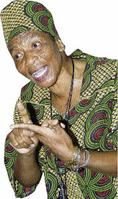Petrina Francis, Staff Reporter

President of the Nurses Association of Jamaica, Edith Allwood-Anderson. - File
WITH LESS than 24 hours before user fees are abolished in all public facilities across the island, except the University Hospital of the West Indies, at least one health-care group is contending that all is not in place to facilitate the new regime.
The Jamaica Labour Party, in its election campaign last year, promised to abolish user fees if it were to win the September 3 general election.
"We need to clearly state that nurses cannot comply with a policy when many of the things are not in place physically. The basic necessities need to be assured both in primary and secondary (health care)," said Edith Allwood-Anderson, president of the Nurses Association of Jamaica.
"We need the supplies, we need human resource, we need every single solitary hand," added Allwood-Anderson.
Nurses demotivated
She also complained about the number of nurses in the system, noting that the cadre has not changed for more than 30 years. There are just above 2,000 nurses in the system currently. The ideal number should be about 4,500.
Allwood-Anderson said the island's nurses were demotivated, frustrated and overworked.
"When you go to Kingston Public Hospital (KPH) and look at Luke Ward (a 63-bed facility), the ward is full and you have one or two registered nurses with one ward assistant and one enrolled nurse, you begin to see that the patients are not being turned as they should and you begin to feel very sorry for the nurses and the people who work on the ward," said the president.
Shortage of doctors
Meanwhile, the Medical Association of Jamaica (MAJ) said it was uncertain if the system could cope with the number of doctors that are currently in place.
"The cadre of doctors in the public health sector has not increased since the 1970s. We don't feel that there are enough doctors in the system," Rosemarie Wright-Pascoe, MAJ president, told The Gleaner. She was, however, unable to say how many medical doctors were employed in the sector.
Wright-Pascoe said the ratio in 2002 was one doctor to 990 patients. She noted that the ideal ratio according to the World Health Organisation is 1:500.
The MAJ boss said members would ensure that there is a smooth transition come tomorrow.

